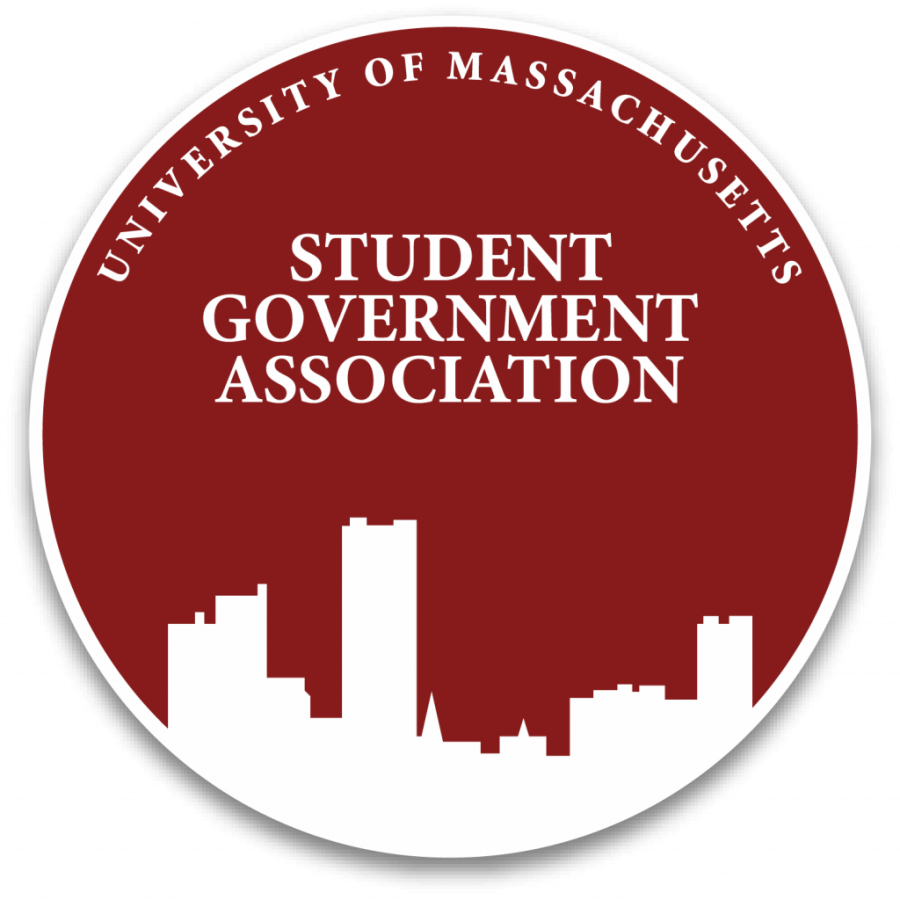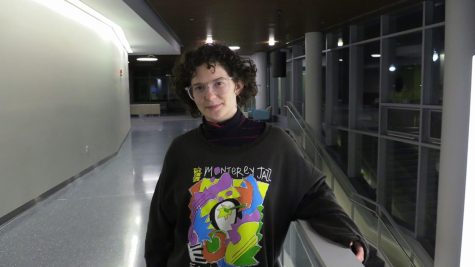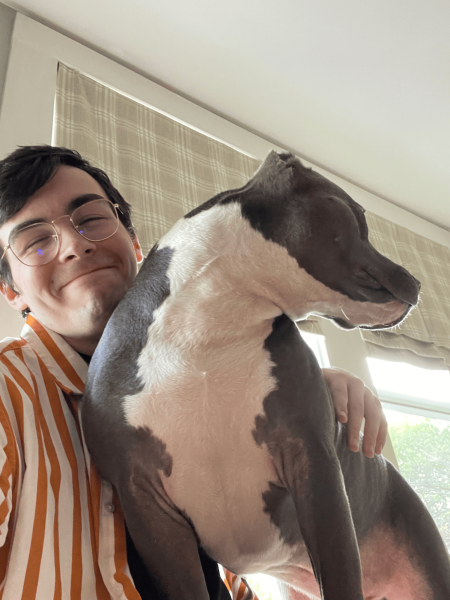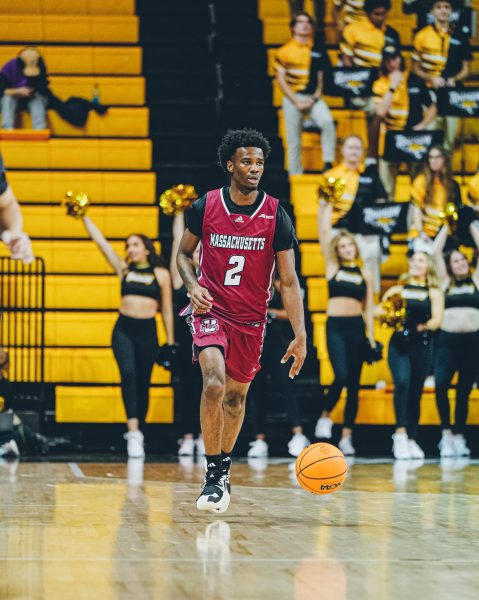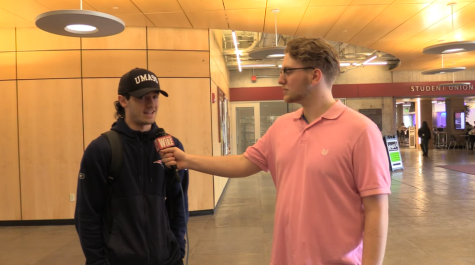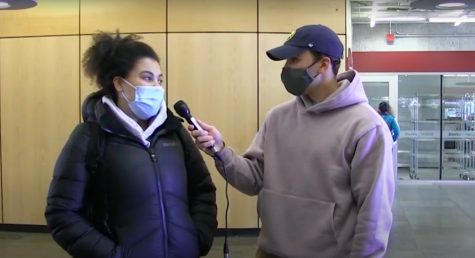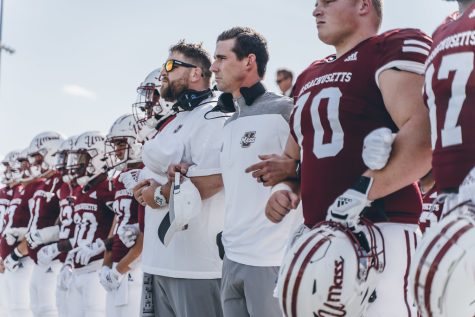- About
- Broadcast News
- Current Affairs
- Features
- In-Depth
- Investigative
- Politics
- Profiles
- Showcase
- Student Life
- Voices
A conversation with Sonya Epstein, the former SGA president who didn’t rerun
Sonya Epstein wanted to create a new path for the Student Government Association, instead they found a confrontational Senate and a dismissive administration: Part one of two
While the past academic year has been well known for its administrative failings, behind the scenes of the Student Government Association, now former President Sonya Epstein, experienced a difficult and tumultuous relationship with members of the SGA. The mental health difficulties of dealing with these confrontations, as well as SGA members spreading rumors about them, eventually led to their decision not to run again despite being only a junior. In this interview, the first half of two parts, they discuss the manufactured confrontations they faced while trying to enact their radical vision of what UMass should be, as well as what they hope SGA members and the administration will imagine what the SGA and UMass could become.
So you’re elected and then we all get sent home. How does that impact your idea and your vision of your role as president?
Yeah, I think that kind of the timeline between March and September was really interesting for me and kind of how I saw my role in SGA. Last Spring, I was running as vice president with my friend Barkha. And then that election got canceled because the week we were supposed to do voting was the week we were not coming back to campus…And then also, when the speaker, Rachel Ellis, stepped into the role of President because we didn’t have elections, it kind of showed that, like, you know, there’s gonna be some time between the next elections. Luckily, the Secretary of Diversity and my Secretary of Diversity, now Carla, was like, do you want to be my deputy secretary of diversity. I think, being in that space when there was the aftermath of the George Floyd murder, was really impactful for me to see how SGA was dealing with that in our role within racial justice at UMass. And I also got time to kind of reflect on do I really want to step into this role? COVID definitely shifted my vision for what was going on, and definitely shifted a lot more towards student rights, especially when so many RAs were suddenly fired, and also towards justice on campus. [We] really, really looked at the UMPD’s role on our campus and the funding they get. And so I think those were definitely some big shifts.
Extending into the fall, there was the utilization of creating racial justice plans, like every member of the Cabinet created their own plan on creating racial justice equality and how they’re going to implement it. I’ve heard some criticisms of that and that there wasn’t enough reaching out to marginalized communities at UMass. I was wondering if you had a response to that.
Yeah, I think that’s a really fair criticism, and I think that’s a huge fault of SGA that’s existed for years and years, possibly decades, even. Just the lack of connection to cultural RSOs, to Black indigenous and students of color on our campus, and all of these really crucial things that we have fallen short on. As well as just the space of SGA, pushing BIPOC students out, because they’re always talked over because they are not welcomed into these higher-up positions. It is a space that upholds white supremacy as a governance body. I think that is something we all have to reckon with. Jennie Chang [their VP] and I weren’t able to solve all of that. And there’s, I think, things that we definitely could have done better and outreach is always a struggle.
I think the plans were for those to have a way to keep us accountable for things that were publicized. I think that’s another part that felt kind of short is that we didn’t like check-in continuously to the rest of SGA like, “Hey, everyone, one of you had goals by the end of January to do this. Where are we at with that?” And I think also that goes into things like the struggle and the failure of SGA with outreach.
We have an amazing PR team, but we need to be getting more creative, but also, in building back that trust, because we can’t be like, hey, BIPOC students, run for SGA, when we know it’s this toxic space for them. I think there’s a lot of work that still needs to be done, and I definitely understand that criticism.
How have you seen this toxic space going into zoom and the SGA remaining virtual?
Yeah, I think there’s definitely been a shift with that. SGA has always not been that great in terms of kindness and understanding. But I think that disconnect with, where you’re able to kind of disconnect, like in person, from just their name on Zoom has made it a lot more confrontational. We don’t run into each other on campus, you can’t just stop by the SGA Office. Instead, we’re all experiencing this Zoom fatigue, and all of these stressors, as well as not having met a lot of these people in real life. I think it’s just easier mentally to kind of be more confrontational. I think that’s added to the toxicity and the lack of understanding within SGA.
A big thing I’ve kind of heard is that there are two different sides of SGA. There’s one side that’s really interested in social justice and really believes it, and then the other side really wants to do SGA for their resume. I don’t know if that’s a fair criticism. I’ve also heard that kind of plays out too, with like, people will debate for hours, and then it’ll end up being a unanimous vote. I wonder if you had any thoughts on that or solutions to it?
Yeah, I think there’s definitely a weird split with SGA, and it shifted over at least the past two years that I’ve seen. Hopefully, we’re all in this space to help students. But the question is, how are we doing that?
First of all, some folks coming into SGA are kind of expecting it to be like their high school SGA, where you’re planning events and stuff like that. That’s kind of like a shock. I think there’s also folks that are coming into SGA, really focusing on the RSO side and kind of the more logistical side. There’s also, I know, a lot of tension around how we deal with administration, where folks have been critical at times of, you know, Are we being too confrontational? That’s why they won’t work with us. That’s why they don’t tell us things we need to make compromises versus the side I tend to take on more is like, they just don’t trust students, they’ll never tell us more. We can’t be making compromises around student rights and students’ wellbeing when we know what we’re fighting for is correct. I think it kind of really comes down to, how are we doing this? How radical can we be in a way, which causes a lot of tension.
With the voting thing, that also always surprises me. There’s been a few votes in the past two years where I’m like, I have no idea which way this will go. I think part of that is also most votes are done through a voice vote. So there’s no record of which way each senator voted. There’s also not a lot of the time constituents reach out and being like, “Hey, I heard this is going up as a motion. I want you to vote this way or like check which way they voted.” We did see that with the MASSPIRG vote, the one a couple of weeks ago, where MASSPIRG folks were really mobilizing and reaching out to their senators, which I don’t think anyone had experienced before. That was really interesting to see, and I do hope to see more of that. But yeah, it’s always interesting when there’s a debate and then we’re like, oh, everyone just voted yes.
What was the most frustrating thing you had to deal with in SGA, as president or, your greatest accomplishment that you look back from this year?
Yeah, I think the hardest part was the consistent disrespect that I felt from all sides at times and the lack of support as well, from administration. So that’s one side where it’s frustrating, but also kind of expected, and then at times, really harsh critiques coming from the student body, which of course are always welcome, but still hard to hear. Then also feeling that disrespect and lack of support from the SGA itself. I kind of felt like I couldn’t catch a break. It was just really exhausting. But even with all of those, it didn’t feel constructive. And it felt just very abrupt at times and overwhelming. This year has been really hard, because I wasn’t able to focus on a lot of the things that I wanted to because of so many COVID emergencies, especially this semester, with the number of students that were brought back, but I think I am really proud of how we were able to come together around those emergencies and how we were able to protect student rights at really crucial moments, especially when we went into high risk and kind of be able to mobilize around those things.
Yeah, in your exit email you said, you really hoped that the SGA would continue to imagine and be more creative in their thinking. Do you have any examples of what you wish they would do?
There’s so many examples of things that I wish would change both within SGA and within administration. The goal is just too low. I think we should be imagining what if our university was fully state-funded, and we didn’t have to force students to pay for an education that they have a right to? What if we could imagine a university without UMPD, not just UMPD with a lesser role, but no UMPD at all? How can we imagine what social justice education looks like on our campus, not just improving existing things but really imagining and putting a lot more money into the cultural centers, into new programs, etc.? I think there’s extra steps that need to be taken because if our goal is so much lower, we’re never gonna accomplish anything, but there’s these things that are possible in so many other places, not every school has a police force and we used to get so much more funding from the state. All of these things are so possible. But we’ve kind of been told that it’s impossible that we shouldn’t even be asking for it because it’s unreasonable and so those are just a few examples but there’s, I think just so many more to imagine at UMass and, you know, just like a world that works better for everyone in it.
What do you see your relationship with being with the SGA now that you’re not President?
I’m definitely taking a step back. I had considered doing a write-in campaign for Senate or something, but I think I realized that at least for the rest of the semester and over the summer I want to have that space to kind of take a break and also heal from a lot of the awful things I had experienced within it. But I’m hoping to continue interacting with SGA I really want to keep pushing for a Restorative Justice Office on campus, which will, you know that’s really my goal to see that accomplished before I graduate and I know SGA will play a role in that and so I think, more working with SGA around various advocacy things that I’m hoping to do.
Yeah, definitely. And then do you feel you would have kind of gotten less really harsh constructive criticism if you hadn’t been non-binary and queer? Or do you think that you would have been attacked to that degree anyways?
I think that’s a good question is something that I’ve, you know I’ve been trying to figure out of like where are all of these really harsh attacks coming from and I think, you know, I do have really similar values and like a kind of similar platform to Timmy Sullivan. Obviously, he got harshly attacked too. There was a whole impeachment against him, but I think in the ways that he did was a bit different. Like having statements put out by certain groups against me was like, not something he had experienced there was also I think a lack of trust in me being able to do my job fully, especially from administration, and also certain people within SGA. I’ve kind of compared my experiences with him, or felt like oh just like administration explain to you how the budget process worked four times, even though you told them you know, he was like that didn’t happen to me once. I think there’s certain things that are different and I think, you know, my queerness and being non-binary and not being a man, definitely impacted that but I think a good amount of it was also just like my politics.
How has this year influenced your relationship to or your idea of the media, because you’ve had so many different interactions with campus media where one week you’ll be asked to do an interview and then next week you’ll be asked to respond to an issue going on in the SGA?
I think it’s definitely been interesting. I never expected myself to be doing so many interviews or interacting with the media so much. It’s been so interesting and I was talking to Cassie McGrath and being like, oh my God, remember during high risk, every week we would just be fact-checking things. A lot of the time I was like, oh my God, are they like gonna write a hit piece on me, just because there’s always those nerves around that. Then also with the student employment piece, we had created a press release and then reached out to really large media outlets and doing all of those interviews was just so strange to me because I had never imagined that, but I think also just within COVID and the administration’s actions around emergencies, it really showed me kind of the critical role that reporting was playing in terms of communicating and transparency, and also just ensuring that students are able to take a stand around what was happening. It was also just useful to go on like The Wire or The Daily Collegian and look through comments on social media and be like okay, this is what students are saying about this issue. I think there’s been a lot of just thoughts and emotions brought up about the media but definitely a lot of them are positive.
When you said you were having these really like negative interactions with members of the SGA, what were they like?
There was just a lot of very direct confrontation. During Senate meetings, during some other meetings, where I was like you didn’t bring this up to me a single time before, and it just felt unproductive and unnecessarily aggressive at times, especially because there were so many other stressors in all of our lives. Then there were just consistent rumors being thrown around that kept getting back to me where people were just starting rumors about my personal life. I don’t understand how this is productive and if people are realizing that I’m like a real person and this is like screwing up my personal life.
How many times a week do you think these confrontations would happen?
I think it depended on the week and stuff, but over the past semester, I was kind of expecting it at every setup meeting more or less, even if it didn’t end up happening, that was kind of how I was bracing myself every week. I honestly couldn’t give you a good number.
What are your hopes for the next administration?
I’m really hoping that there’s a continuation to ensure the student’s voice is represented within administrative decisions and also student rights are protected. You know I think there’s definitely a difference in values and platforms with myself and the administration that is stepping in, but those are things that are so crucial to protect especially, as we continue navigating COVID, and all of the struggles that come with that.
I also think that, you know, hopefully we can kind of reimagine what SGA looks like and really transform that, which you know is said every year, but I think if we continue pushing for it and kind of critically looking at the SGA role within the student body, and with administration, there can be some great changes made so I hope at least there’s movement around that.
I’m sorry this is a circling back question but when did you realize you didn’t want to run again?
Yeah, it was definitely a big question kind of the whole time, where so many people were asking me right from the beginning, or I think that didn’t ask me, but there was the expectation that I would run again because I’m a junior right now. A lot of time, you want to maintain power and stuff like that and I thought that I wanted to for a while, at least for part of last semester and I think over winter break. I really sat down and was like I need to figure this out, and I had made a promise to a few people I was like, I’ll let you know for sure by the end of December. And then I was like, I haven’t decided yet. I was really torn because every day I would wake up and be like, I definitely want to run, and then I’d be like, Nope, just kidding. Definitely no and then the next day it would be the opposite. But I think it really came down to just realizing that, instead of this role helping me achieve what I wanted to with what I want to see transformed at UMass sort of it being a tool for that and helping me with that. It felt like it was taken away from that. I didn’t have time to pursue these things that I was so passionate about and the changes that I want to see at UMass, and also like stepping into SGA spaces and being afraid, being like, how am I going to be critiqued? Someone’s going to confront me right now in front of 60 people and I’m going to have to deal with it on the spot. And I think, just like the impact that had on my mental health, made me realize that I wasn’t in a space where I could serve students to the best of my ability anymore and I think the student body deserves the best that it can get and I wasn’t able to provide that.
Email Talia at [email protected] or follow her on Twitter @HeiseyTalia

